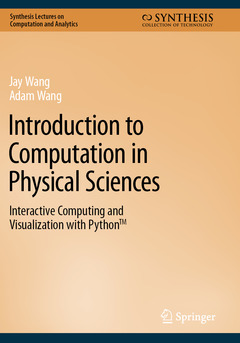Introduction to Computation in Physical Sciences, 1st ed. 2023 Interactive Computing and Visualization with Python™ Synthesis Lectures on Computation and Analytics Series
Langue : Anglais
Auteurs : Wang Jay, Wang Adam

This book provides a practical and comprehensive introduction to computational problem solving from the viewpoints of practitioners in both academic and industrial worlds. The authors present scientific problem-solving using computation and aim to increase computational thinking, which is the mindset and skillset required to solve scientific problems with computational methodologies via model building, simulation, data analysis, and visualization using the Python programming language. Topics and examples span fundamental areas of physical science as well as contemporary topics including quantum computing, neural networks, machine learning, global warming, and energy balance. The book features unique and innovative techniques and practices including: intentional scaffolding to help beginners learn computational problem solving; multimodal computing environments including cloud-based platforms and just-in-time computing; emphasis and connection between both numerical and symbolic computations; and extensive exercise sets carefully designed for further exploration as project assignments or self-paced study. The book is suitable for introductory level readers in physical sciences, engineering, and related STEM disciplines. Specifically, the book is appropriate for use in either a standalone course on computation and modeling and as a resource for readers interested in learning about proven techniques in interactive computing.
Programming environments.- Python Tutorial.- Interactive computing and visualization.- Basic algorithms.- Force and motion.- Oscillations and waves.- Modern physics and quantum mechanics.- Statistical and thermal processes.- Complex Systems.
Jay J. Wang, Ph.D. is a Professor and Chairperson in the Department of Physics at UMass Dartmouth. He received his Ph.D. in Theoretical Atomic Physics from the University of Tennessee. Dr. Wang's interests include computational physics, physics education, and research pertaining to the computation and integration of interactive computation in physics and related STEM curricula.
Adam L. Wang received his M.S. in Physics from the University of Chicago, where he was awarded an NSF Graduate Research Fellowship. He has worked on complex systems and nonlinear dynamics, aided by computational tools. More recently, he uses machine learning, interactive computing, and visualization as a data scientist.
Emphasizes both numerical and symbolic computations and stresses model building and intentional scaffolding to help beginners learn computational problem solving Introduces contemporary cutting edge topics such as quantum computing, machine learning, and global warming with working examples and electronic resources provided in the Python programming language Focuses on interactive computing and just-in-time computing and uses multimodal devices and environments including cloud-based platforms with strong emphasis on visualization and animation
Date de parution : 01-2024
Ouvrage de 255 p.
16.8x24 cm
Date de parution : 01-2023
Ouvrage de 255 p.
16.8x24 cm
Thème d’Introduction to Computation in Physical Sciences :
© 2024 LAVOISIER S.A.S.



